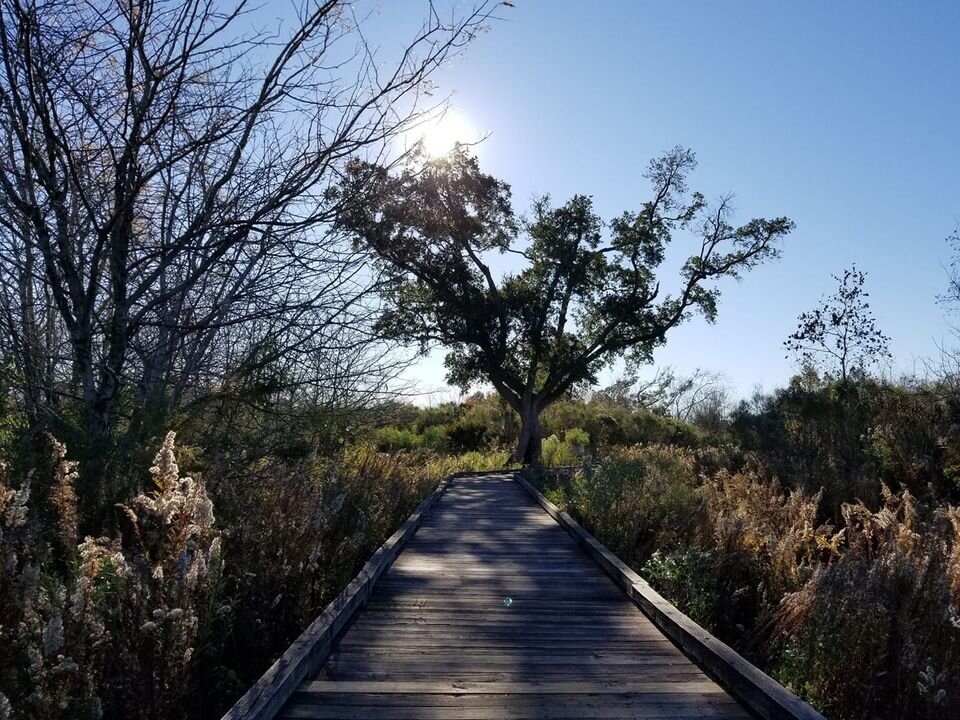Trees are some of nature’s greatest wonders. Providing food, shelther, and countless other resources to creatures large and small (including humans!), it’s no wonder we’re so fascinated with them.
Arboretums are places dedicated to the preservation and admiration of different tree species. Of course, where there are trees, you can be sure to also find plenty of other plants, flowers, and the creatures that love them.
In Southern Louisiana, arboretums often stand out for their easy hiking, fantastic bird watching, and of course their unique southern species of trees. In this post, we’ve put together a list of some of our favorite arboretums in the area that are worth a visit.
1. Couturie Arboretum
A group enters the Couturie Arboretum hiking trail.
Here at LOOP, we’re of course partial to our neighbor, Couturie Forest & Arboretum in New Orleans. Combined with adjacent Scout Island, this 60-acre portion of City Park includes nearly two miles of interconnected trails. Don’t let the arboretum’s urban location fool you; it contains many natural wonders to explore.
Couturie contains native and non-native trees brought in for restoration after Hurricane Katrina, New Orleans’ second-highest natural point, and possibly the city’s best bird-watching. At a whopping 43ft, Laborde Mountain is sure to give young visitors used to flatlands a fun thrill. Reach out to us at LOOP if you’d like to schedule a group for a guided nature hike or canoe tour with our knowledgeable staff.
2. Hilltop Arboretum
Boardwalk at LSU Hilltop Arboretum (from Wikimedia Commons)
Louisiana State University maintains the 14 acres of Hilltop Arboretum in Baton Rouge. First developed in 1929 with the vision of creating a natural cathedral, it was donated to LSU in 1981. The arboretum’s most accessible areas are concentrated in a central visitor’s center. With educational signage and a gift shop, it’s the perfect place for a quick trip or a relaxing stopover.
Visitors to Hilltop Arboretum enjoy native trees such as live oak, magnolia, cypress, and many more. There are also a few non-natives including Japanese maple and bamboo. A large hill makes for an excellent picnic spot, especially for kids. Visit the on-site plant nursery and take envy-inducing photos.
3. Barton Arboretum
Hiking loop at Barton Arboretum (from LSU)
In addition to Hilltop Arboretum, LSU maintains the 2.3-mile hiking loop and natural resources in Barton Arboretum. Also located in Baton Rouge, visitors can enjoy a circular drive through memorial live oaks set within a pine forest. If you’d like to get out and walk around, there are dedicated features such as a palmetto walk and camellia collection that are certainly worth a visit.
Hiking the trail will lead you to the arboretum’s signature pond with its abundance of plants, including irises. A gazebo provides a quiet resting place for reflection. Education stations detail historical and botanical facts about the native plants along the way.
4. Cohn Arboretum
Trail within Cohn Arboretum (from BREC)
Maintained by the Recreation and Park Commission for the Parish of East Baton Rouge, or BREC, Cohn Arboretum contains 16 acres of heavily wooded land used for the preservation and study of native and non-native plants and flora. This arboretum was once the site of a family home, and was donated to BREC in 1965.
Today, visitors enjoy the fruit orchard, Louisiana iris, accessible teaching garden, paved walking trails, and multiple floral collections and water features. Watch fish dart below lily pads or visit the preserved caretaker’s house with period furnishings for a truly unique experience. There are even stations for birdwatching, painting, and drawing.
5. Louisiana State Arboretum
Inside Louisiana State Arboretum’s interprative center (from LA State Parks)
The first state-supported arboretum in the U.S., Louisiana State Arboretum in Ville Platte boasts more than 600 acres of natural growth. Additional native species have been added to create an even more stunning visitor experience, with the prarieland terrain lending itself to dramatic landscapes. Almost every type of Louisiana vegetation is represented on the site.
Due to preservation efforts, removing or damaging plants or animals in this arboretum is strictly prohibited. Visitors are also not permitted to picnic or bring pets, but are encouraged to head to nearby Chicot State Park for picnic areas. Follow those simple rules, and you’re welcome to explore the multiple interactive exhibits, nature trails, and facilities.
6. Jungle Gardens
Buddha Temple inside Jungle Gardens (from Wikimedia)
Located on Avery Island, the Jungle Gardens were created by the son of the inventor of Tabasco Sauce. While not strictly an arboretum, here you’ll find four miles of gravel roads lined with live oak trees and Spanish moss. You can also spot azaleas, Japanese camellias, hydrangeas, Louisiana irises, palms, papyrus sedges, bamboo, and wisteria.
Be sure to visit the bird sanctuary, called Bird City, where snowy egrets and other wildfowl roost each spring and summer. Jungle Gardens also hosts a gorgeous Chinese garden with a glass Buddha temple. The Buddha inside dates back to 1100AD and was a gift to the garden’s creator in 1936.
Bonus! The Crosby Arboretum
Pondside iris at the Crosby Arboretum (from Wikimedia)
Okay, so this one’s not in Louisiana, but it’s so close and notable that we couldn’t pass it up. The Crosby Arboretum is located in Picayune, Mississippi, and is maintained by Mississippi State University. With 104 acres of interpretive sites set within 700 acres of additional natural space, it’s probably the largest arboretum in the area.
The mission of the Crosby Arboretum is to educate the public about the environment. This makes it a perfect place for educational field trips and family outings. With a focus on plants native to the Pearl River Drainage Basin ecosystem, the arboretum’s cultural, scientific, and recreational programs are sure to meet any goals you have in mind for your group. Multiple exhibits and displays make this a highly accessible nature trip.









